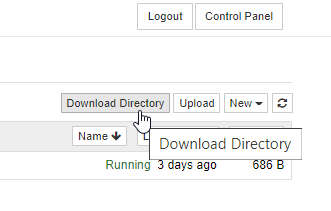Download your data from the hub#
You might want to download your entire home directory for many reasons - to get data off a hub that is closing, to migrate to a different service, for archival purposes, etc. Your home directory will contain all your data and your notebooks. Hubs managed by 2i2c make this easy.
Download from the hub interface#
Open the classic Jupyter Notebook file browser. If you are using another interface, navigate to the classic interface by changing your URL path to
/tree. e.g.,<your-hub>.pilot.2i2c.cloud/user/<your-username>/treeClick on
Download Directory.
This will zip up the contents of your user file system and download them to your machine.
Note
If your hub is using a custom user environment, it needs the
jupyter-tree-download package
installed to make this feature available. As it is a Jupyter Notebook extension, you
must install this in your image - manually installing with !pip inside your notebook
will not work.
Download the archive of your home directory from an S3 bucket#
If you have requested that 2i2c archive all the home directories of the hub users and store them to an S3 bucket, you can follow the instructions below to download them.
Make sure the user has an AWS account created for them and they can successfully authenticate from the command line. See the AWS guide for more details.
Assign the
AssumeHomedirsArchiveAccesspolicy to their AWS IAM user, which allows them to access the S3 bucket where the home directories are archived. Replace<username>with the user’s name and<account-number>with the AWS account number.aws iam attach-user-policy \ --user-name "<username>" \ --policy-arn "arn:aws:iam::<account-number>:policy/AssumeHomedirsArchiveAccess"
Run an
aws s3 lsto make sure you can see the S3 bucket where the home directories are archived.aws s3 ls s3://<cluster-name>-<hub-name>-homedirs-archive/<username>/
Download the archive of your home directory from the S3 bucket.
aws s3 cp s3://<cluster-name>-<hub-name>-homedirs-archive/<username>/archive-<some-date>.tar.gz /path/to/download/
